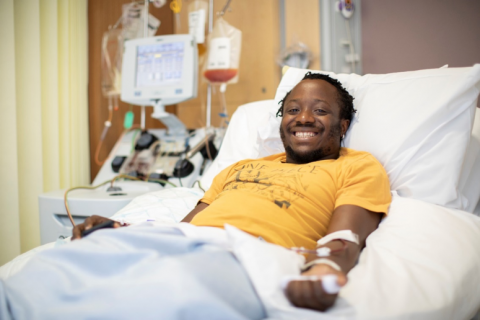When Doug found out about the need to diversify the stem cell register, he immediately signed up. This Black History Month, he wants to spread the word about the difference joining the register can make.
Seven years ago, at university, I went to a Marrow event and they were talking about stem cell donations. I found out that when someone has blood cancer or a blood disorder, a stem cell transplant could save their life. They need stem cells from a healthy donor who's a good genetic match.
A few months ago, I was that donor.
The reason I joined the register
At the Marrow event, they told me that if the person who needs a match is from a European background, they have around a 60% chance of finding one. But if they're from a Black, Asian or minority ethnic background that drops to about 20%. It's down to the fact that there aren't as many donors on the register from those backgrounds. That got me to sign up immediately.
Cancer is something that can affect anybody at any point in their life. If my family or friends got blood cancer, I'd want them to have the best chance of surviving. We need more Black people on the register to save more lives.
Donating isn't what you might expect - in a good way
Seven years after signed up, I got a call saying "You could be a potential match. Do you want to go ahead with it?" - and I said yes.
I'll admit that at first, I was a bit nervous, but I was mostly excited that I could help someone. And the whole process doesn't take up much of your time. I got a health check and some tests which put my mind at ease.
Then, nurses came to my house to give me an injection for four days before donation day. I felt a bit achy but I took paracetamol and was fine. The injections increased my stem cells.
Then, on donation day, I sat in a hospital bed and they took blood from me, to transplant into the person who needs it. I thought it might take longer, but it was only four hours.
I think there's this idea that a lot of people have that donating will hurt. I didn't find any of it painful at all. I thought I'd have to go under local anaesthetic but it was just like giving blood or getting an injection before you go on holiday. And to be honest, even if it was painful, I think a little bit of pain is okay when you've got the chance to save someone's life.
What really matters
It feels absolutely amazing to know that doing this will change someone's life. When you think about saving a life, it's not just their life that's important - it's their friends and family too, everyone who's part of that person's life. You might be saving one person but you're having an impact on a whole family and community, so it feels amazing.
We need to get the word out about the need for Black donors
I feel like a lot of people don't know about this but if they did, I think they'd sign up straight away - like I did. So now I tell people about it. I told friends about my donation and it got them thinking about wanting to join the register as well. My mum and my girlfriend are extremely proud - they're going round telling everybody too. It's important to get the word out.
I'm extremely happy that I signed up. So, for Black History Month, join me and sign up to the register. Change the future for Black people with blood cancer. You could be a match. You could save someone's life.
Join the stem cell register today, because you could be a match for someone who needs one right now. You could literally save a life.
